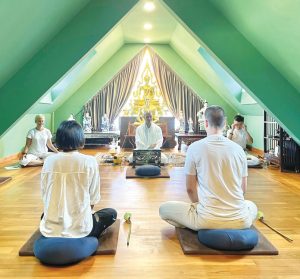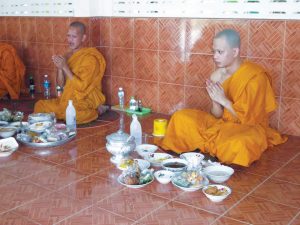 Tell us about your life before you became a monk?
Tell us about your life before you became a monk?
I was a very self-centered young boy. I was violent towards my mother, and almost killed my father when I was 14. Not only did I wreak havoc at home, but I also got into fights at school and was eventually expelled. By 2011, I was 23 years old and spending my days in Singapore drinking, partying, splurging on luxury goods, street racing and meeting girls. One day, I quarrelled with my parents and got so angry that I tried to set fire to their bed. Fortunately, I used a cooking oil that I didn’t know wasn’t flammable.
How did monkhood come about?
That same year, I went on a short trip to the south of Thailand and was offered the opportunity to live in a monastery for a week. Since there’s a stereotype that Buddhist monks know the best way of life, I decided to try it out. I wanted to know why I was unhappy, angry, and dissatisfied with life. Also, a big part of me wanted to take photos of myself as a monk to show off to my friends.
Can you remember your first day?
On my first morning, I woke up in a foreign land where nobody could speak my language. The guest monk arrived at my door to help me with my robes – three big pieces of cloth with a sash to hold them together. I followed him into the main hall, sat on a straw mat and looked at the Buddha statue – the only object of familiarity around me. More monks arrived, and a deep sense of comfort and excitement began to build up in me.
Your time in the monastery lasted longer than a week …
The spiritual calling was sudden and strong, literally within the first few days. I continued living as a monk in monasteries around the world for five years with the Plum Village Community of Engaged Buddhism (plumvillage.org).
Given your unruly past, how easy was this?
Not easy at all! My teacher rehearsed the formalities with me to receive alms. The food in the monastery was not palatable and the reality that my head and eyebrows were shaved took a bit of getting used to. But I sacrificed all of my material comforts in search of an unknown meaning. Back then, I still had no real idea what Buddhism or meditation was really about, but it felt right.

What was a typical day like?
Days started at 3.30am with chanting and meditation. Then we’d receive alms from the locals, clean assigned communal areas, do communal work, read, and engage in more chanting and meditation. We’d have a tea gathering at around 5pm.
Did you have specific duties to carry out in the monastery?
A monk is not without worldly responsibilities. At certain points I was in charge of guest relations and also worked directly under the abbot as his personal assistant, event coordinator and ghostwriter. A big part of my experience in Plum Village also involved coaching, consultancy, and dialogues and conferences with psychologists, neuroscientists, business owners and change makers.
What realisations did you have?
They say life is a story, so it’s up to us to know when to end a chapter and write a new one. We all have a tale to tell the moment we learn to be inspired by it. Whatever hardship or undesirable circumstances you may find yourself in right now or in future, you must learn to zoom out of it and realise you’re in charge of your own narrative.
Can you share any standout lessons?
Whatever decisions we choose to make or not make in life, we must be accountable for them and make peace with them. We’re making conscious choices all the time. When we make a choice to be at any place or in any circumstance, we have to make the best of it.

Why did you leave the monkhood?
I wanted to prove to city dwellers that enlightenment is possible in a fast-paced society through the power of mindfulness and meditation. In order to do that, I had to leave the monastery to gain first-hand experience of the kind of obstacles modern society was facing. I knew that disrobing would help me to discover new ways to teach modern people how to practice inner-peace.
“We all have a story to tell
the moment we learn to be
inspired by it”
How did it feel living back in Singapore?
I soon realised that I had zero skills to get any product or service off the ground! When I started my company The Hermitage Zen in 2017, I survived on $500 per month for two years. This included me eating the exact same bowl of noodles every day because it was the only thing I could afford.
Did you ever want to return to monkhood?
Never. Even when my progress was being sabotaged, I made a point to celebrate any shortcomings because I needed to taste modern suffering. Difficult moments just provided me with more evidence that meditation and mindfulness works.
How does meditation and mindfulness work exactly?
They both helped me to understand that many successes are built upon failures. Through meditation, I realised that my aspirations to return to society were based on the ability to experience worldly suffering, and to show others that peace is possible amidst chaos.
Tell us about The Hermitage Zen …
It’s a mindfulness-based spiritual learning organisation that works with individuals at every stage of their growth. We have a community that supports one another through innovative programmes, workshops and retreats. To do this, we integrate ancient wisdom from Eastern spiritual traditions with today’s world.
We have to ask, how’s your relationship with your parents today?
Really good! We reconnected and reconciled a month after I joined the monkhood.
What advice would you give the young DK today?
Listen and value advice from people who are more experienced and successful than you. And always remain humble.
 Meditation V Mindfulness
Meditation V Mindfulness
- Meditation offers the opportunity for you to settle your mind in order for you to be aware of the flickering thoughts going through your head. With a calm and introspective mind, you can understand what barriers are separating you from inner peace.
- Mindfulness means to live fully in the present instead of living in your head, bouncing between moments in the past and future. It awakens you to the wonders of life that are happening here and now.
thehermitagezen.com
instagram.com/theformermonk
facebook.com/thehermitagezen



 Meditation V Mindfulness
Meditation V Mindfulness




